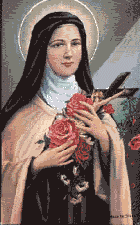Wednesday in the Octave of Easter
 Easter reminds us of these fundamental requirements of the Christian life: the practice of piety and the exercise of patience. Through piety we live detached from human frailties, in purity of mind and body, in close union with Christ. Through patience we succeed in strengthening our character and controlling our temper so as to become not only more pleasing to the Lord for our own sake, but an example and encouragement to others, to our fellow men, in the various contingencies of social life.
Easter reminds us of these fundamental requirements of the Christian life: the practice of piety and the exercise of patience. Through piety we live detached from human frailties, in purity of mind and body, in close union with Christ. Through patience we succeed in strengthening our character and controlling our temper so as to become not only more pleasing to the Lord for our own sake, but an example and encouragement to others, to our fellow men, in the various contingencies of social life.The Resurrection of the Lord truly represents—and for this reason it is celebrated every year—the renewed resurrection of every one of us to the true Christian life, the perfect Christian life which we must all try to live. "The Resurrection of Christ is the sacrament of new life."
My beloved brothers and children! First of all let us look closely at our pattern, Jesus Christ. You see that everything in his life was in preparation for his resurrection. As St Augustine says: "In Christ everything was working for his resurrection."
Born as a man, he appeared as a man for but a short time. Born of mortal flesh, he experienced all the vicissitudes of mortality. We see him in his infancy, his boyhood, and his vigorous maturity, in which he died. He could not have risen again if he had not died; he could not have died if he had not been born; he was born and he died so that he might rise again. This is what St Augustine tells us in simple, sublime words.
--Prayers and Devotions from Pope John XXIII


0 Comments:
Post a Comment
<< Home